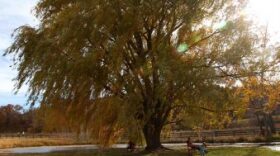The Naturalist Nights speaker series is put on by the Wilderness Workshop and the Aspen Center for Environmental Studies. This year’s series started with controversy when presentations on wolves and mountain lions at the Third Street Center in Carbondale turned contentious.
First it was a vocal group of ranchers opposing the reintroduction of wolves to Colorado. Then a week later, dozens of mountain lion hunters, guides and outfitters came from across the western slope. They filled the Calaway Room to capacity during a presentation on the challenges facing conservation efforts of the predatory cat.
Wendy Keefover, the speaker at the event, is a native carnivore protection manager for the Humane Society of the United States. She believes mountain lions and humans actually share space pretty well, with the apex predator coming down into towns at night to eat raccoons and then retreating to surrounding open space to sleep during the day. What she doesn’t believe is that hunting big cats is necessary to protect people, cattle or game.
“In Colorado we’ve had an age-long debate that we have to kill carnivores in order to grow mule deer populations, and the best available science does not bear that out,” Keefover said during her talk.
She also cites studies suggesting that the presence of predators increases biodiversity. But several outfitters and guides in attendance are skeptical. They question if what Keefover really wants is to end the practice of hunting the cat in Colorado.
Shouts from the audience questioned her motives.
After the discussion, Neill Call is discussing the event with other hunters.
Call has hunted mountain lions for three years. He knows Keefover cares about preserving the animal just like he and other outfitters do. But, he takes issue with her use of research.
“The information she’s presenting to these uneducated people that don’t spend time outdoors and don’t see what populations are and how lions truly interact with each other," Call says "… She’s misrepresenting information that she’s getting from studies that are drawn from other states.”
Keefover acknowledges her opposition to mountain lion hunting, but thinks the outfitters’ objections to her research are the result of a “clash in values.”
“It’s really hard for me, I’m a woman, coming in, telling them here’s the science, and it doesn’t jive with their value system and so they don’t listen,” she says.
While she admits that hunters spend plenty of time learning mountain lion behavior as they track them, she doesn’t trust anecdotes over science.
“Are you going to trust an outfitter or are you going trust the scientific studies?” says Keefover.
The series continues through February and into March with topics including the impact of pesticides on bee populations and how wildfires shape Colorado’s landscape.A link to upcoming talks.



